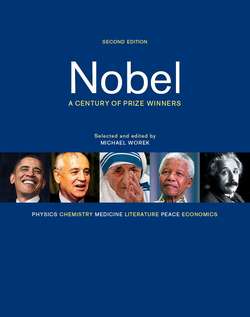Читать книгу Nobel - Michael Worek - Страница 39
На сайте Литреса книга снята с продажи.
ОглавлениеElihu Root (1845–1937)
1912 Peace
A man of engaging personality who has tried, with determination and independence, to put his ideals into practice.
Elihu Root, one of the most brilliant administrators in American history and distinguished with the Nobel Peace Prize in 1912, was born in Clinton, New York, on February 15, 1845. He studied at Hamilton College, where his father was a mathematics professor, and completed his secondary education in 1864 at the top of his class. In 1867 he completed his degree in law at New York University and, at the age of 30, was already a respected lawyer specializing in commercial law.
His great capacity to understand legal principles, his excellent analytical powers, disciplined attention to detail and ease of expression, both written and oral, gave Root an almost unequalled reputation. He became an advisor to banks and railroad and oil companies, quickly acquiring a fortune as he did so. In 1878 he married Clara Frances Wales, and the couple had three children together.
During this time Root also made tentative entries into politics, becoming involved in the local branch of the Republican Party. In 1899 President William McKinley, wanting a lawyer rather than a military figure to serve as his secretary of war, invited him to fill this position. Root accepted the call of what he termed “the greatest of all our clients, the government of the country,” and served as the 41st United States secretary of war between August 1, 1899 and January 31, 1904.
While in office he reorganized the administrative system of the Defense Department, established new rules for promotion, created the general staff and imposed administrative discipline on the armed forces. During the Spanish-American War Root drew up a strategy to return control of Cuba to the Cuban people, designed a democratic plan for the government of the Philippines and eliminated tariffs imposed on goods imported from Puerto Rico.
In 1904 he returned to law, but he turned back to politics once more after being nominated as secretary of state by President Theodore Roosevelt. He left a notable body of work and solved many foreign policy problems that the country had been struggling with for years. Some of his actions include placing the Consular Service under the Civil Service, maintaining an “open door” policy with the Far East and working with Great Britain to resolve Alaskan territorial disputes between Canada and the United States.
As a senator between 1909 and 1915 he played an active role in resolving the conflict over fishing rights in the North Atlantic and campaigned for an end to American privileges in the Panama Canal. In 1915 he resigned as a senator and declined the Republican nomination as candidate for the presidency of the country. He continued, however, to be an active statesman. He opposed the neutrality adopted by President Woodrow Wilson during the early months of World War I but supported him after America declared war on Germany. He accepted Wilson’s invitation in 1917 to head a special diplomatic mission to Russia, and he was later involved in both the signing of the Treaty of Versailles and the creation of the League of Nations.
Root, who was the first president of the Carnegie Endowment for International Peace, dedicated a significant part of his career to questions of international negotiation. Besides work on the creation of the Central American Court of Justice in 1907, he was heavily involved in establishing the Permanent Court for International Justice in 1921. In 1929, at the age of 84, he undertook intense diplomatic work in Geneva to establish a revised protocol for the Permanent Court.
In 1912 Root received the Nobel Peace Prize for his mediating efforts toward international peace. Known as one of the greatest diplomats of the 20th century, he acknowledged the need for an international perspective in this global age: “Gradually, everything that happens in the world is coming to be of interest everywhere in the world, and, gradually, thoughtful men and women everywhere are sitting in judgment upon the conduct of all nations.” Some of Root’s best known works are Citizen’s Part in Government (1911), Experiments in Government and the Essentials of the Constitution (1913) and Military and Colonial Policy in the United States (1916).
This quest for peace and justice was the life’s cause of an extraordinary statesman. Elihu Root died in New York City on February 7, 1937, and was buried at the Hamilton College Cemetery. The home that he purchased in 1893 is now a National Historic Landmark.
